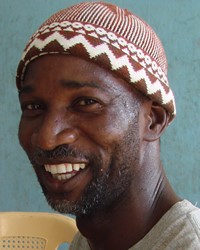One of the first Soninke settlements was established in Ghana around A.D 750. Because of persecution by the Berbers, the Soninke dispersed into small groups within the neighboring regions. The three main sub-groups of the Soninke are the Marka, Nono, and Azer. Often, these tribes are further broken into smaller clans that specialize in various crafts. Four of the most important Soninke tribes are the Sisse, Drame, Sylla, and Kante. Some of these groups eventually intermixed with the local Wolof, Serer, and Malinke tribes.
Today, there are a significant number of Soninke in Cote d 'Ivoire, making up a very small percentage of the country's total population. They live primarily along the northern border of Cote d 'Ivoire. Many also live across the border in Mali and Burkina Faso. Due to influence by a large nomadic tribe known as the Fulani, the Soninke have become farmers and herdsmen. They speak a Mandingo language called Soninke (or Marka).
The Soninke people live in various parts of West Africa, including a small community in Guinea. There are large numbers of them in Cote d 'Ivoire, Gambia, Mali, Senegal, and Mauritania.
The social structure and organization of the Soninke are typical of Mande-related people groups. They are farmers who raise sorghum, rice, peanuts, and their staple crop, millet. They also raise large numbers of goats, sheep, horses, chickens, and cattle. Very little fishing and hunting is done, and trade is extremely important. The Soninke trade in the local markets. They also travel to markets in other regions to trade their goods.
In the past, Soninke men cleared the land and cultivated the crops; the women also worked in the gardens. Today, however, they have one of the highest rates of labor migration in West Africa. Much of the male population is absent from the home doing migrant work, which often lasts from two to four years. With the women, old men, and children left behind, a form of matriarchal (female-dominated) society has evolved.
The Soninke live in compact villages, in which homes are built in two distinct styles. One style is round huts with brick walls and thatched roofs. Other houses are rectangular with brick walls, interior courts, and flat terraced roofs. Houses line both sides of the main street, and a mosque is typically located at the village square.
Soninke marriages require the payment of a bride-price. In contrast to most neighboring tribes, the bride-price is given to the bride rather than her parents and becomes part of her dowry. Pre-marital sexual relations are forbidden. Polygyny (having more than one wife) is generally accepted, with each man being limited to four wives by Islamic law.
In the past, inheritances were passed down from fathers to sons. Today, Muslim rules govern the dispersion of property: one-eighth goes to the widow, while equal shares go to each son and half shares go to each daughter.
Most of the Soninke in Guinea practice their traditional ethnic religion. They are primarily animists, which means that they believe that a spirit or force resides in every animate and inanimate object. They live in fear of evil spirits and constantly strive to appease them. The remaining are Sunni Muslims, following the teachings of the Islamic prophet Mohammed. They faithfully adhere to the five essential "pillars," or duties, of Islam. These include affirming that "there is no god but Allah, and Mohammed is his prophet;" praying five times a day while facing Mecca; giving alms generously; fasting during Ramadan, the ninth month of the Muslim year; and making at least one pilgrimage to Mecca, if possible.
There are so few believers among the Soninke people that they will need to depend on outsiders to take them the gospel. There are many vibrant West African believers who can go to them as Christ's ambassadors.
Pray for families of Soninke believers loving and serving others to grow reproducing churches.
Pray for a chain reaction of Soninke families reaching families that results in thousands of new believers who share their faith with others.
Pray for grace and truth expanding into the entire Soninke society as all believers learn to love others.
Pray that churches and believers will bless their entire people group in such a way that God's love will change the Soninke people like yeast changes dough.
Scripture Prayers for the Soninke, Sarakolé in Guinea.
https://joshuaproject.net/people_groups/14996/GV
https://joshuaproject.net/people_groups/14996/GA
http://www.linkupafrica.com/sites/default/files/soninkeRave.pdf
| Profile Source: Keith Carey |











